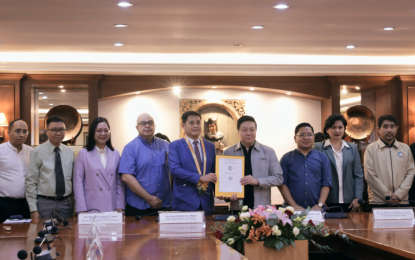
CLIMATE INNOVATION. Climate Change Commission Vice Chairperson and Executive Director Robert E.A. Borje (5th from left) and University of Santo Tomas (UST) Rector and President Fr. Richard Ang (4th from right) hold the cooperation agreement for climate innovation and sustainability that they signed in UST, Manila on Oct. 17, 2023. The collaboration will also serve as a platform for sustainable entrepreneurship, fostering collaborations and initiatives that will promote environmentally conscious business practices. (Photo courtesy of CCC)
MANILA – The Climate Change Commission (CCC) and the University of Santo Tomas (UST) have officially signed a cooperation agreement, solidifying their commitment to advancing climate innovation and sustainability in the country.
As the lead government agency mandated to coordinate and monitor climate change programs in the Philippines, the CCC has teamed up with UST, one of the country's top educational institutions, to strengthen efforts in addressing the impacts of climate change and enhancing the climate resilience of local communities.
Through lectures, seminars and workshops, the CCC-UST partnership will facilitate knowledge exchange and capacity building to enhance climate literacy, nurturing future leaders in the field of climate science.
The collaboration will also serve as a platform for sustainable entrepreneurship, fostering collaborations and initiatives that will promote environmentally conscious business practices.
“Through capacity building and education, the CCC and the UST will collaborate to create educational programs that equip our youth with the knowledge and skills needed to raise awareness about climate change and empower them to take action towards a more sustainable future – making that all-important link between technological development, innovation, research and development from the academic community to the local communities,” CCC Vice Chairperson and Executive Director Robert E.A. Borje said during the signing of the agreement on Oct. 17.
“Our key areas of collaboration include research, knowledge sharing, and expert exchanges through academic lectures, seminars, training workshops, and even short courses. We can make a big difference in climate change mitigation and adaptation strategies through our joint efforts,” UST Rector and President Fr. Richard Ang said.
After the signing of the cooperation agreement, the CCC gained firsthand insights into the restoration efforts and witnessed the dedication of UST experts working towards preserving historical library collections, which falls under non-economic loss and damage.
Non-economic loss and damage refers to the intangible and irreplaceable cultural, historical, and social heritage that is lost or damaged due to climate change impacts.
“Our partnership with UST can go beyond research and development. It can also include preserving our cultural heritage in the face of climate challenges. Witnessing the restoration efforts firsthand reinforces our determination to safeguard our historical collections, ensuring that they will be seen by the generations to come,” Borje said.
The historic collaboration brings together the CCC's expertise in policy formulation and program implementation and UST's renowned faculty and research community.
Both institutions endeavor to drive transformative climate actions, supporting local communities and fostering a more sustainable future for all. (PNA/PR)
